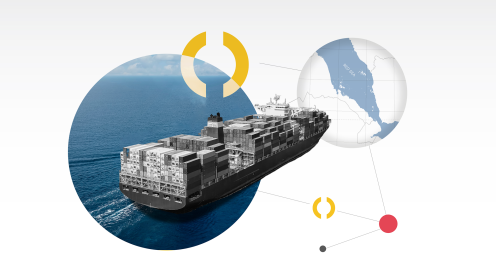Unlocking answers: Key Freight Marketplace questions addressed
1. What's the difference between The Freight Marketplace and freight exchange platforms?
Freight Marketplace is definitely not a freight exchange platform. It prioritises contracted business, unlike freight exchange platforms that predominantly focus on single shipment spot shipments. While spot shipments are also facilitated on Freight Marketplace, its scope goes beyond that. Currently, our emphasis lies in single-lane events, referred to as mini-bids, encompassing multiple shipments within a specific contract period for a single lane. This feature proves particularly beneficial for businesses with project or seasonal demands. Looking ahead, our future plans involve extending the capabilities of Freight Marketplace to include larger strategic multi-lane tenders. Additionally, we aim to broaden its coverage to include more modes beyond road transport, which is the current focus. This evolution emphasises a substantial distinction between the Freight Marketplace and conventional freight exchange platforms.
2. How exactly does Freight Marketplace differ from other freight procurement tools?
Many freight procurement tools were developed for the internet age, but Freight Marketplace is tailored for the era of data science. This marks a significant shift in focus. Shippers and carriers demand a procurement process that is faster and more efficient. Achieving this necessitates leveraging data insights to drive decision-making.
Here's where we chart the path forward. For instance, integrating market prices directly into the decision-making process and utilising our proprietary weight benchmarking product, exclusive to the Freight Marketplace. Furthermore, we enhance the matching of shippers and carriers based on their activity and profiles.To execute these advancements – and many more – the underlying data structure of the tool must be robustly designed. This is precisely what sets Freight Marketplace apart.
"Our approach differs from other procurement tools because we've prioritised building a platform grounded in a solid data infrastructure."
3. Freight Marketplace currently focuses on Mini Bids or Mini Tenders. But what exactly are Mini Bids/Tenders?
Freight Marketplace specialises in Mini Bids or Mini Tenders, which are contracted procurement events enabling businesses to secure transport services for a specific lane within a defined volume and time frame, usually spanning one to three months. This agile approach facilitates swift and efficient negotiations, ensuring the seamless acquisition of contract freight capacity, thereby enhancing operational efficiencies, fostering stronger relationships, and streamlining logistics within a unified platform. Our service will soon expand to manage contracted bids of any size seamlessly, from start to finish, all within a single tool.
4. Can I integrate my existing carrier pool into Freight Marketplace and decide when to engage with an extended pool of carriers?
Existing carrier pools can be seamlessly integrated into Freight Marketplace. We firmly believe in the advantage of maintaining a diverse mix of both familiar and new carriers within Freight Marketplace. Shippers have the autonomy to determine which carriers have full access to event details and which receive an anonymised view. This approach allows you to find new carriers and to leverage the strengths of both your existing pool and the extended pool, creating an optimal solution for your needs.
5. Which carriers have access to the transports I offer? Is it limited to those activated for my company or does it include all carriers registered on the Freight Marketplace platform?
In general, all carriers with access to the Freight Marketplace platform will have visibility into all events posted by shippers. However, shippers retain the ability to control the level of access granted to each carrier for specific events. They can designate certain carriers to have full access to event details, while others may only view limited information. For carriers not directly added by the shipper to an event, they will see an anonymised version. This means critical details such as the shipper's name, contact information, or exact pickup and delivery locations won't be visible. Instead, they'll have access to essential information like the country, two-digit zip codes of pickup and delivery locations, as well as volume requirements. This enables carriers to still submit offers while maintaining privacy.
“This approach benefits bothcarriers and shippers. Carriers gain access to more events than they would if solely invited, allowing them to showcase their services by submitting offers. Meanwhile, shippers benefit from receiving more offers and discovering new carriers without compromising sensitive details about their shipments or identity. It's a win-win situation for all parties involved.”
6. What does multi-dimensional negotiations mean—negotiating beyond just price?
Negotiations in Freight Marketplace extend beyond just price. While price remains a cornerstone of any bidding event, other factors can also come into play. For instance, shippers have the flexibility to include considerations such as emissions, capacities, and transit times in their offerings and counteroffers during negotiations with carriers.
This means carriers can input their prices while providing additional information such as CO2 emissions, capacity, and transit times. Shippers then have the ability to assess these elements and decide which carrier best aligns with their requirements or negotiate further based on these factors. The inclusion of these elements in negotiations is entirely at the discretion of the shipper. They have the autonomy to determine whether they want to consider emissions, capacities, transit times, or focus solely on price.
7. How is sustainability integrated into Freight Marketplace?
We're initiating the process by implementing emissions calculations for events. This involves precisely determining the kilograms of CO2 emitted for each bidding event based on various factors, including the distance from pickup to delivery and the type of fuel used—whether diesel, gas, or electric. Additionally, we consider the emission standard classes of the vehicles, such as Euro 5 or 6. For carriers, we offer the option to specify the fuel type and Euro emission standard class of their vehicles in their offers. Using this information, we calculate the emissions associated with each offer.
This not only provides valuable data but also empowers shippers to make awarding decisions that consider both price and the environmental impact of the shipment. It offers a holistic approach to decision-making, ensuring that cost and emissions are taken into account when selecting carriers.
8. How do you ensure data privacy on Freight Marketplace?
All users entering Freight Marketplace must first accept our terms of use. This serves as a foundational measure to ensure compliance and protection. Regarding the data shared between shippers and carriers within the platform, we've introduced features to allow users to control the extent of information visibility to their counterparts. This includes the ability for shippers to anonymise events, granting select carriers full access while limiting others to a restricted view.
Additionally, we're continuously enhancing our functionalities to further safeguard data privacy. Two upcoming features include the option for carriers to accept conditions, such as non-disclosure agreements (NDAs), before accessing an event—a step toward establishing mutual agreements between shippers and carriers during negotiations. On the carrier side, profiles are available for showcasing capabilities, with customisable visibility settings. Carriers can designate which information is accessible to specific shippers, ensuring sensitive data remains confidential while still providing relevant details to potential partners.
9. What is the cost of using Freight Marketplace for shippers and carriers?
Freight Marketplace offers a two-sided pricing model. Shippers can enjoy the platform for free – bringing the concept of a free logistics procurement platform to life. And don’t forget, it’s designed for all types of shipping firms to make use of, including those looking for a free freight procurement tool for small businesses.
Carriers have access for a low monthly membership fee of €100 (or $100 in the US), and benefit from a 30-day free trial period to explore the online freight booking platform's functionality at no cost.
10. Is Freight Marketplace available only for road transport? Do you have any plans for ocean and rail?
Currently, Freight Marketplace is exclusively focused on road transport, particularly Full Truckload (FTL) shipments, as it represents the largest segment of the transport sector. In 2024, we are set to expand into additional modes of transportation, including ocean, air, and rail. This strategic expansion will cater to a wider range of shipping needs, enable shipper users to find reliable carriers for free, and offer a more comprehensive solution overall.




